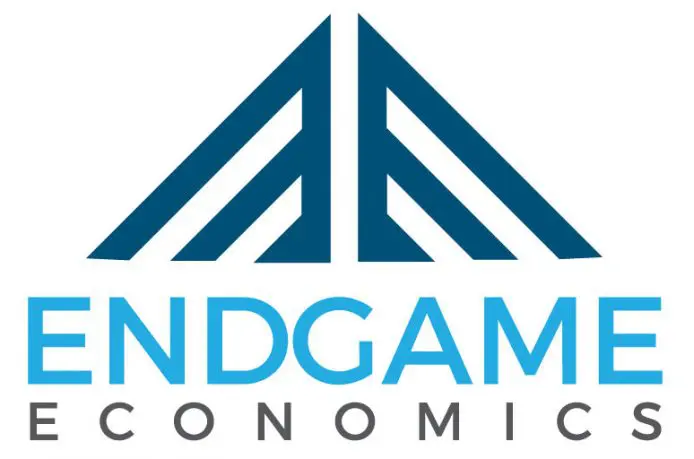Endgame Economics, one of our Reservoir Street office residents, builds models to solve their clients’ problems. They build economic models, mathematical models, models based on their knowledge of industry. Working with their clients, these models are used to solve their problems. The Office Space sat down with Oliver Nunn to discuss the endgame of economics and the problem solving involved in getting there.
When did you start Endgame Economics and why? I started Endgame in February this year, having worked as a professional economist and applied mathematician for the last six years, mainly working for consultancies. I really enjoyed my time as a consultant, and I learned a great deal. Late last year I decided to change the type of work I was doing. I wanted to focus on problem solving, principally using mathematics and economics. That necessitated me starting my own firm, and so here we are.
What are the key things Endgame Economics offers? Endgame sets itself apart by offering the twin capabilities of:
- knowledge and expertise in economics and mathematics;
- the ability to communicate and interact with our clients, and so understand their problems.
Expertise in economics and mathematics, and experience applying this to real-world problems is critical to who we are. Our first analyst has a Masters in Economics – his thesis examined the effect of renewable energy technologies on electricity prices. We have just hired a senior staff member who has a PhD in pure mathematics, and extensive experience in the energy sector. We can also communicate. We can write clear, concise reports that explain complex technical concepts in simple language. We have experience interacting with experts with a variety of skill sets: economists and financiers; lawyers and policy makers; engineers and computer scientists. As a result, we are often called on to work within other teams to help them solve large, complex problems.
Tell us about your clientele The vast majority of our clients are in the electricity and gas sectors, but this is changing. I am increasingly being approached by people from other industries, most notably mining, water, and transport who have really complex problems that they want to solve. I am always interested to hear from people in different, obscure sectors. Notwithstanding, electricity and gas still accounts for the bulk of our work, but we work for a wide variety of clients in these sectors. Our team has experience working for virtually every type of player in the sector: power stations, major energy users, network businesses, retailers, renewable energy developers, businesses selling new technologies, gas pipeline operators, and owners of gas fields. Because we work across the entire sector, we are often asked to advise governments and regulatory bodies about how energy markets should be designed and regulated. These are some of the most interesting projects to be involved in, because you help to shape the future of the sector.
Your area of expertise (according to LinkedIn) is ‘mathematical and economic models for electricity and gas markets.’ For those of us unfamiliar, can you expand on this? Yes, despite my best efforts to confuse them with my missing website, my clients still appear to be contacting me. So as I said, Endgame builds models. Most of my career has been spent building models to help my clients understand the electricity and gas sectors. Three examples are as follows:
- When the Government introduced the carbon price, I worked for power stations to help them understand what would happen to the prices they receive for generating power. I built models to predict the effect that this would have, and helped them decide how they would operate;
- About a year ago, Tesla announced the launch of its home battery system, the Powerwall. Electricity generators and network (ie, poles and wires) operators wanted to understand how these batteries would affect their business. I built models to help them predict how these batteries might operate, and to recommend strategies for responding;
- Recently I worked with the national energy market rule-maker to examine the prices that households and small businesses pay for electricity and gas. We built models using data for thousands of electricity and gas contracts (e.g. from Origin, AGL, etc.) to assess whether the market is achieving good outcomes (i.e lower prices) for customers.
In our July blog piece ‘Fiscal Minds,’ you mentioned the importance of ‘keeping in touch with your clients.’ Would you say you devoted a large portion of your time to doing this? I definitely devote a lot of my time to keeping in touch with my contacts, whether they be clients, other experts, or people I have worked with in the past. This would probably account for 30 per cent of my time. There are two reasons I devote so much time to this. First, every one of my clients is an expert on a particular type of problem, or a particular part of an industry. As a result, they are my often my first call when I am trying to solve a problem. So keeping in touch is often them helping me, help another client. Second, by keeping in touch, I understand the challenges they are facing, and so I can ensure that I know when a new development will affect them. For example, I spoke to an electricity market trader who told me they were interested in the effect of a change in regulation. Two days later, a person at the regulator told me the same thing, and so now I have a problem worth investigating.
What drew you to The Office Space? What impact has it had on your business? After searching for weeks, I was quite dejected about the options available for leasing office space in Sydney. I wanted a boutique, high quality environment, and I wanted someone else to manage everything: the cleaning, security, printing, internet, electricity bills, reception, etc. I also wanted somewhere that could accommodate a growing team, where I could just make a call and get some space for a new team member. The Office Space was the only place that met these requirements. It has had a tremendous impact on my business. I really enjoy coming to work, and it has given me more time and energy to focus on my business. I also do not have to worry about planning to accommodate new staff.
Can we please have one more tip for bettering our financial position in the new financial year? I’m glad to hear my others were popular. Try and be a creative negotiator. I don’t mean be tougher, or nastier – negotiation is often thought of as being about ‘pistols at dawn,’ but that’s a misconception. Negotiation is about creativity. Try and work out whether there is a way you can create opportunities for you and the person you are negotiating with. If you can be creative, you will make better deals every time.







